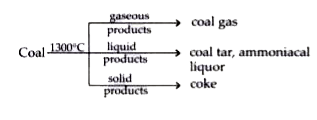Though coke is made from coal, it is used for metallurgical processes instead of coal. Give reasons.
Step-by-Step Solution:
1. Understanding the Composition of Coke:
- Coke is a solid carbonaceous material derived from the destructive distillation of coal. During this process, volatile compounds are removed, leaving behind a product that is primarily carbon.
2. Purity of Coke:
- Coke is known to be one of the purest forms of carbon, containing about 98% carbon. This high carbon content is crucial for metallurgical processes.
3. Role of Coke in Metallurgical Processes:
- In metallurgical processes, particularly in the extraction of metals from their ores (like iron from iron ore), coke acts as a reducing agent. It helps in reducing metal oxides to their respective metals by providing the necessary carbon.
4. Comparison with Coal:
- Coal, on the other hand, contains a mixture of various compounds including carbon, hydrogen, sulfur, and other impurities. The presence of these impurities can hinder the efficiency of metallurgical processes.
5. Reasons for Using Coke Instead of Coal:
- The key reasons for using coke instead of coal in metallurgical processes are:
- Higher Carbon Content: The high carbon content in coke makes it more effective as a reducing agent.
- Purity: The lower presence of impurities in coke compared to coal ensures a more efficient reaction during metal extraction.
- Better Combustion Properties: Coke burns at a higher temperature and produces a more consistent heat, which is essential for metallurgical processes.
Conclusion:
Coke is preferred over coal in metallurgical processes due to its high purity, high carbon content, and better combustion properties, making it a more effective reducing agent for extracting metals from their ores.
---
- Coke is a solid carbonaceous material derived from the destructive distillation of coal. During this process, volatile compounds are removed, leaving behind a product that is primarily carbon.
- Coke is known to be one of the purest forms of carbon, containing about 98% carbon. This high carbon content is crucial for metallurgical processes.
- In metallurgical processes, particularly in the extraction of metals from their ores (like iron from iron ore), coke acts as a reducing agent. It helps in reducing metal oxides to their respective metals by providing the necessary carbon.
- Coal, on the other hand, contains a mixture of various compounds including carbon, hydrogen, sulfur, and other impurities. The presence of these impurities can hinder the efficiency of metallurgical processes.
- The key reasons for using coke instead of coal in metallurgical processes are:
- Higher Carbon Content: The high carbon content in coke makes it more effective as a reducing agent.
- Purity: The lower presence of impurities in coke compared to coal ensures a more efficient reaction during metal extraction.
- Better Combustion Properties: Coke burns at a higher temperature and produces a more consistent heat, which is essential for metallurgical processes.
Coke is preferred over coal in metallurgical processes due to its high purity, high carbon content, and better combustion properties, making it a more effective reducing agent for extracting metals from their ores.
Similar Questions
Knowledge Check
Coke is used in metallurgical process chiefly as
AFluxBreducing agentCslagDoxidising agentCoal tar is used in manufacture of:
Asynthetic dyesBdrugsCexplosivesDall of these
The most important use of coal tar isAit is a source of aromatic hydrocarbonsBit is a good reducing agent for extraction of ironCit is used as a fuelDit is used for making shoe polish.
